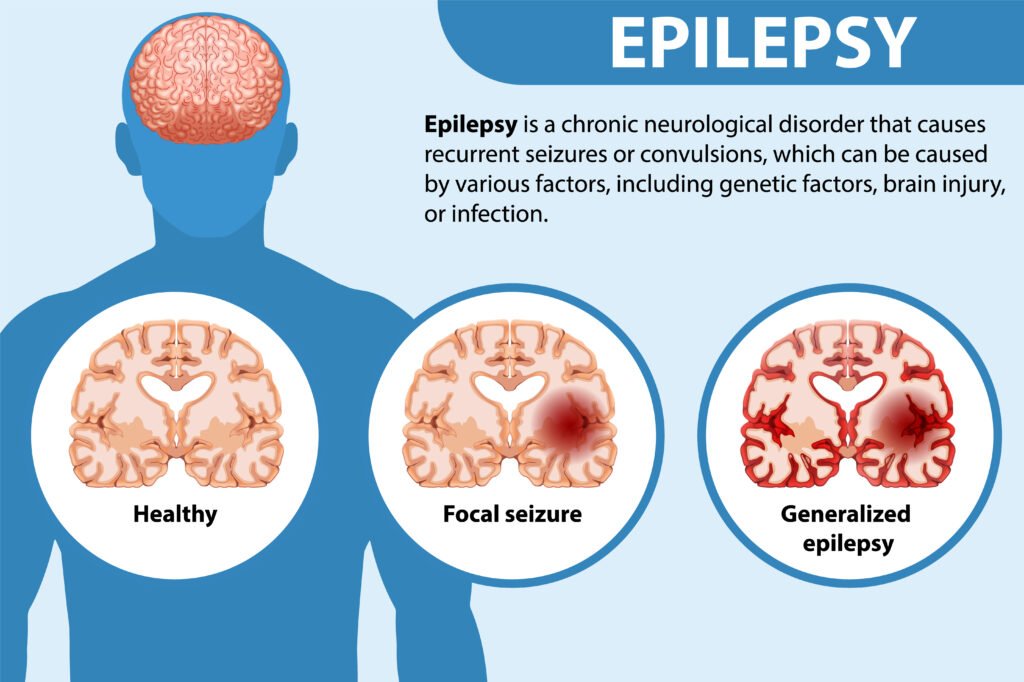Epilepsy is a neurological disorder characterized by recurrent, unprovoked seizures caused by abnormal electrical activity in the brain. These seizures can vary widely in intensity and duration, ranging from brief moments of unconsciousness to more prolonged episodes of convulsions and loss of awareness. Epilepsy can affect people of all ages and backgrounds, and while many individuals with epilepsy can manage their condition with medication, others may require specialized medical intervention. In such cases, consulting neurosurgeon doctors in kanpur may become a crucial part of the treatment plan, especially when surgical options are considered.
Causes and Types of Epilepsy

Epilepsy has numerous potential causes, ranging from genetic factors to brain injuries. Some of the most common causes include:
- Genetic predisposition: Some types of epilepsy run in families, indicating a hereditary link.
- Brain injuries: Traumatic brain injuries (TBI) from accidents or head trauma can lead to epilepsy.
- Infections: Conditions like meningitis or encephalitis that cause inflammation in the brain may result in epilepsy.
- Stroke: A lack of oxygen to the brain during a stroke can lead to seizure activity.
- Developmental disorders: Conditions such as autism or neurodevelopmental delays can be associated with epilepsy.
Epilepsy is classified into two major categories: focal seizures and generalized seizures. Focal seizures originate in one specific part of the brain, while generalized seizures affect both hemispheres of the brain simultaneously. Understanding the type of epilepsy a patient has is crucial in determining the most appropriate treatment.
Symptoms of Epilepsy
The hallmark symptom of epilepsy is recurrent seizures. However, the manifestation of these seizures can vary significantly, depending on the area of the brain involved. Common symptoms include:
- Sudden periods of confusion or loss of consciousness
- Uncontrollable jerking movements of the arms and legs
- Temporary confusion or staring spells
- Loss of awareness during daily activities
- Sensory disturbances, such as strange smells, sounds, or visions
- Emotional or psychological symptoms, such as fear, anxiety, or déjà vu
If someone experiences a seizure, especially for the first time, it is important to seek medical attention promptly to determine if epilepsy is the underlying cause.
Role of Neurosurgeon Doctors
Neurosurgeon doctors in Mandhana play an essential role in the management of epilepsy, especially for patients whose seizures cannot be adequately controlled by medication. While antiepileptic drugs (AEDs) are the first line of treatment, up to 30% of patients with epilepsy do not respond to medication alone, a condition known as refractory epilepsy or drug-resistant epilepsy. In these cases, surgical interventions may be considered.
Neurosurgeons specializing in epilepsy surgery aim to identify and remove or alter the area of the brain responsible for seizure activity, known as the seizure focus. The most common surgical procedures include:
- Resection surgery: This involves the removal of a small portion of brain tissue where seizures originate. Temporal lobectomy, which targets the temporal lobe, is the most common type of resection surgery.
- Laser ablation surgery: A minimally invasive procedure where a laser is used to destroy the seizure focus without the need for a large incision.
- Vagus nerve stimulation (VNS): A device is implanted under the skin to send electrical impulses to the vagus nerve, helping to reduce the frequency of seizures.
- Responsive neurostimulation (RNS): A device is implanted in the brain to monitor and respond to abnormal brain activity, stopping seizures before they start.
In Mandhana, neurosurgeon doctors use advanced diagnostic tools such as EEG (electroencephalogram) and MRI to pinpoint the exact location of seizure activity in the brain, ensuring that any surgical treatment is as precise and effective as possible. These specialists are highly trained in providing both medical and surgical care to help patients achieve seizure control and improve their quality of life.
Conclusion
Epilepsy is a complex and often challenging condition, but with the right medical care, individuals living with epilepsy can lead full, productive lives. For patients in Mandhana, neurosurgeon doctors offer expert care, especially when surgery becomes a necessary step in treatment. Whether through medication, surgery, or other interventions like VNS, these specialists work closely with patients to manage epilepsy and minimize its impact on their daily lives.



